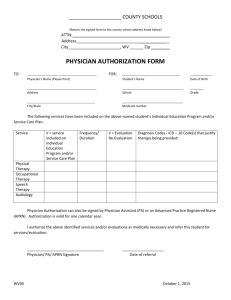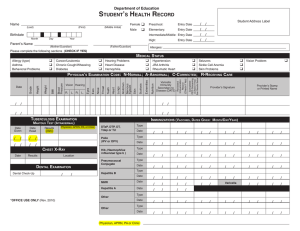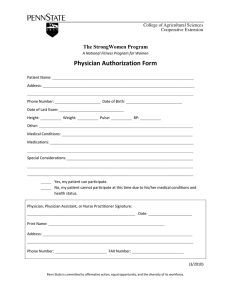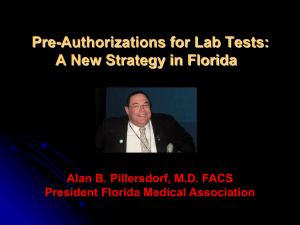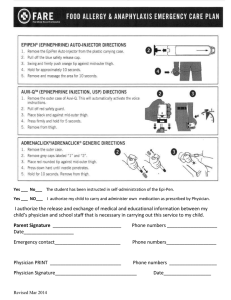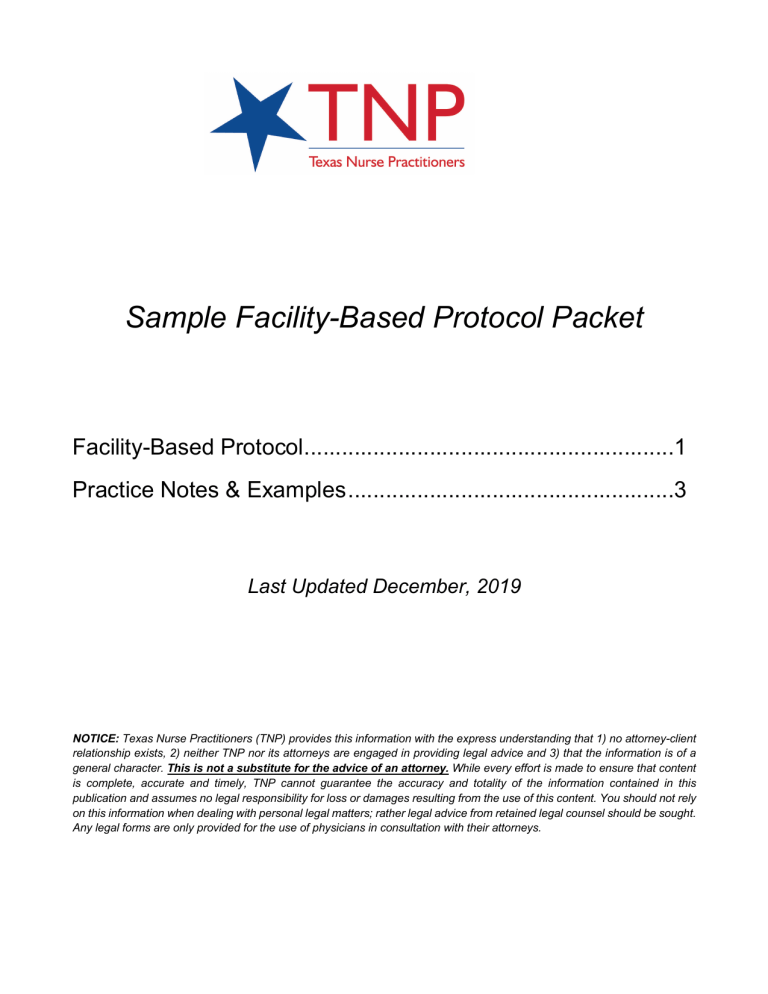
Sample Facility-Based Protocol Packet Facility-Based Protocol...........................................................1 Practice Notes & Examples ....................................................3 Last Updated December, 2019 NOTICE: Texas Nurse Practitioners (TNP) provides this information with the express understanding that 1) no attorney-client relationship exists, 2) neither TNP nor its attorneys are engaged in providing legal advice and 3) that the information is of a general character. This is not a substitute for the advice of an attorney. While every effort is made to ensure that content is complete, accurate and timely, TNP cannot guarantee the accuracy and totality of the information contained in this publication and assumes no legal responsibility for loss or damages resulting from the use of this content. You should not rely on this information when dealing with personal legal matters; rather legal advice from retained legal counsel should be sought. Any legal forms are only provided for the use of physicians in consultation with their attorneys. Facility-Based Protocol A facility-based protocol is a written authorization whereby a physician delegates authority to an Advanced Practice Registered Nurse (APRN) to initiate medical aspects of patient care, including delegation of the act of prescribing or ordering a drug or device at a facility-based practice. General Provisions This Facility-Based Protocol is between the physician and the Advanced Practice Registered Nurse (APRN) listed below. The physician and APRN hereby acknowledge that the APRN’s practice under this agreement is restricted to a single hospital or licensed long-term care facility. This delegation authorization has been developed in accordance with policies approved by the facility’s medical staff or a committee of the facility’s medical staff as provided by the facility bylaws. This Agreement shall be reviewed, dated, and signed by the parties to the Agreement at least annually and shall be maintained in the practice setting. Amendments must be written and signed by the parties. Identification of Parties Physician: ____________________________________ Physician is the: (mark one) ☐ Medical director or chief of medical staff of the facility ☐ Chair of the facility’s credentialing committee ☐ Department chair of the APRN’s facility department ☐ Physician who consents to the request of the Medical director or chief of medical staff to delegate prescriptive authority to the APRN Advanced Practice Registered Nurse: ____________________________________ The following may be prescribed: ☐ All dangerous drugs (non-scheduled) ☐ All schedule III-V (within the restrictions defined by 22 Texas Administrative Code (TAC) §222.8(b)) ☐ All schedule II (for patients meeting the requirements of 22 TAC §222.8(c)) Limitations: _________________________________________________________________________ Alternate supervising physician(s): Name Signature ___________________________________________________________________________________ ___________________________________________________________________________________ ___________________________________________________________________________________ This Agreement is entered into and signed on this date: _________________________________ Physician Signature: _______________________ APRN Signature: ___________________________ 1 Annual Review: Date of Review Physician Signature APRN Signature ___________________________________________________________________________________ ___________________________________________________________________________________ ___________________________________________________________________________________ Pursuant to Section 160.007 of Texas Occupations Code, Texas Health & Safety Code 161.032 and 42 USC Sec. 11101 et seq., this information is confidential & privileged. 2 Practice Notes & Examples The information below is intended to provide general guidance on filling out the Facility-Based Protocol in this packet. Keep in mind that the language below is merely general guidance. These should be individualized to address the particular needs of the APRN’s practice, including the APRN’s experience, office procedures and patient population. Please review the legal disclaimer on the cover page of this packet prior to using any of the suggested language, as it applies throughout. General Notes: Protocols need not describe the exact steps that an APRN must take with respect to each specific condition, disease, or symptom. Supervision must conform to what a “reasonable, prudent physician would find consistent with sound medical judgment” and may vary based on the experience of the APRN. Protocols or other written authorization should promote the APRN’s ability to exercise professional judgement and be in alignment with the APRN’s experience and education. Continuous supervision is required; however, constant physical presence of the physician is not required. Additionally, APRNs with prescriptive authority are required to complete additional continuing education hours. Be sure to check the Board of Nursing webpage to determine which requirements apply to you. Facility based prescriptive delegation may not permit the prescribing or ordering of a drug or device for the care of patients of any other physician without the prior consent of that physician. This consent may be obtained in many different methods, such as policies within a group practice, contracts between the facility and the physician group or a simple form, signed by the physicians, indicating their approval for the APRN to prescribe for their patients under the designated physician’s delegation. Physicians may delegate to an unlimited number of APRNs via a facility-based delegation in a hospital; however, they may only use a facility-based delegation at a single hospital or two licensed long-term care facilities. Delegation at a long-term care facility is limited to the Medical Director of the facility and is limited to a maximum of seven full time equivalents for APRNs and physician assistants. Use of a facility-based delegation does not prevent the physician from also delegating at other sites using a prescriptive authority agreement. The following may be prescribed: Practice Note: In most cases, and especially if experienced, there should not be any limitations on the types of drugs that the APRN may prescribe. However, in some circumstances, it may be preferable to limit prescribing to only pharmaceuticals in broad types or categories. For example: antidepressants, oral contraceptives, antihypertensive agents, antibiotics, antiviral agents, medications to treat fibromyalgia, etc. It is recommended that individual names of drugs not be noted. 3
